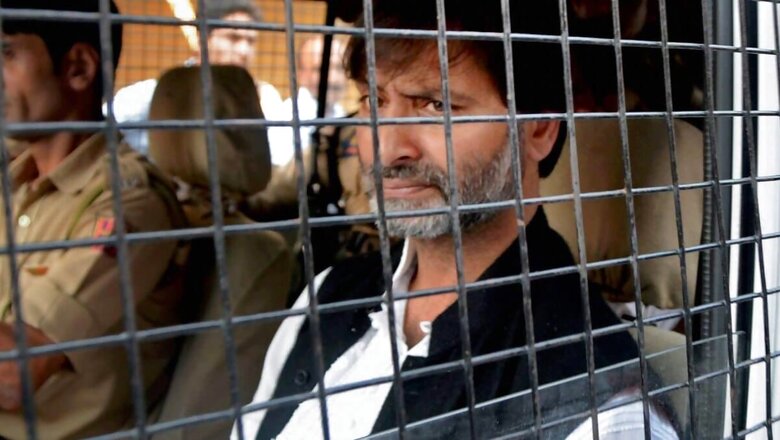
236
views
views
The plea challenges the order of special NIA judge Shailendra Malik, who awarded Yasin Malik a life sentence. The matter is up for hearing before a division bench of the HC on May 29
The National Investigation Agency on Friday moved the Delhi High Court seeking a death sentence for Kashmiri separatist leader Yasin Malik in the Jammu and Kashmir terror funding case. The plea challenges the order of special NIA judge Shailendra Malik, who awarded Yasin a life sentence.
The matter has been listed for hearing before a division bench of the high court on May 29. CNN-News18 accessed the details of the NIA plea.
Here are the details:
- ‘Spearheaded, involved in terrorist activities in Kashmir Valley for decades’: The NIA stated that Yasin Malik, over decades, had been involved in and spearheading terrorist activities in the Valley. He did this with the help of foreign terrorist organisations; he masterminded, planned, engineered and executed armed rebellion in the Valley in a bid to usurp the sovereignty and integrity of India, the central agency added.
- ‘Offences acts of external aggression’: The plea stated that it was proven “beyond reasonable doubt” that the offences committed by Yasin were “ex-facie acts of external aggression, brazenly planned and executed by acts of waging war against the nation”. “Internal disturbance” was created by raising and using trained and armed militia within the state and by helping trained terrorists raised in enemy states to infiltrate the borders, the plea added.
- ‘Findings of trial court flawed, unsustainable’: The NIA told the HC that the findings of the trial court, that this case was not in the rarest of rare categories, was flawed and “completely unsustainable”. The NIA said the life sentence awarded by the special court on the grounds that the present case was not in the category of the rarest of the rare cases is “ex-facie legally flawed and completely unsustainable”.
- ‘Complete erosion of sentencing policy’: The NIA stated that if “terrorists” like Yasin Malik were not awarded capital punishment on the grounds that they pleaded guilty, then it will result in a complete erosion of the sentencing policy. It will further create a device, whereby such “dreaded terrorists after indulging, waging and spearheading an act of war against the state, in case caught, would have a way out”, it said. The plea further stated that such a sentence will not be commensurate with the crime committed, “where due to their act of war, the nation has lost its valuable soldiers”.
- ‘Miscarriage of justice’: The NIA also told the HC that not awarding capital punishment in this case will result in a “miscarriage of justice as an act of terrorism is not a crime against society but… against the entire nation”.
While pronouncing his order while awarding a life term to Yasin, the special judge had made the following observations:
- ‘Engaged in violent terrorist activities’: The special judge observed that the convict was engaged in violent terrorist activities before 1994. The claim that he “gave up the gun in 1994” and was, thereafter, recognised as a legitimate political player is evident by the fact that the Government of India had engaged with him and provided him platforms to express his opinions.
- ‘No reformation, no regrets’: The judge stated that “in my opinion, there was no reformation of this convict. It may be correct that the convict may have given up the gun in the year 1994, but he had never expressed any regret for the violence he had committed prior to the year 1994”.
- ‘Betrayed government of India’: The judge further observed that while the convict claimed to have given up violence after 1994, the central government took him at face value and gave him an opportunity to reform and, in good faith, tried to engage with him in a meaningful dialogue. However, the convict did not desist from violence and, rather, betrayed the “good intentions” of the government.
- ‘Wanted to secede J&K from India’: The special judge observed that the crimes for which Yasin had been convicted were of a “very serious nature”. These crimes were intended to “strike at the heart of the idea of India and intended to forcefully secede J&K from UOI (Union of India)”.
- Crime more serious as it was with foreign help’: The judge further observed that the crime was “more serious” as it was committed with the assistance of foreign powers and designated terrorists. “The seriousness of crime is further increased by the fact that it was committed behind the smoke screen of an alleged peaceful political movement,” the special judge stated.




















Comments
0 comment